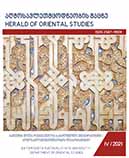თურქული ელემენტები მარადიდის მეტყველებაში
Turkish elements in Maradidi's speech
Author(s): Lile TandilavaSubject(s): Language studies, Language and Literature Studies, Lexis, Sociolinguistics, Philology
Published by: ბათუმის შოთა რუსთაველის სახელმწიფო უნივერსიტეტი, ჰუმანიტარული მეცნიერებატა ფაკულტეტის აღმოსავლეთმცოდნეობის დეპარტამენტის „ელექტრონული ჟურნალი“.
Keywords: Turkish elements in Maradidi's speech;
Summary/Abstract: In the world, there is no language without borrowed words. The Georgian language is not an exception in this regard. It has undergone many historical upheavals, which are reflected in the language vocabulary. As it is known, most of the territories of South Georgia and Lazeti are located on the territory of modern Turkey, and the Georgian population, living there, are citizens of the Republic of Turkey, who speak two languages, one of which is the native Georgian language, and the other is Turkish, the state language of the country, through which people communicate with all existing institutions in the country.Turkish has become the dominant language for them, and its scope is much wider. Thus, the Turkish vocabulary was introduced into the spoken Georgian language.In 1921, the official border was drawn between Turkey and Georgia. Two villages of Georgia - "Maradidi" and "Sarpi" shared the same fate: they were divided in half. Not only the villages were divided, but also families, relatives and homeland. This severe pain has not been healed and was passed down from generation to generation. Turks call the village of Maradidi "Muratli". Exactly one century later, a group of scientists from Batumi University came to this village for the first time. They found, recorded and published materials for the monograph "Maradidi".I was interested in the material included in the monograph, and I set out to find out how much Turkish vocabulary is included in the Georgian language, which is spoken in this particular geographic region. In the course of the research, interesting grammatical and phonetic changes were found: in the research material, borrowings mainly refer to the nominative parts of the language, where there occurs deafening of voiced sounds, their alternation and addition.The borrowings in the verb part are quite few.In the Georgian Maradidi dialect,there is relatively less Turkish vocabulary than in the Laz dialect.The following conclusions can be drawn:In Maradidi, there are used parallel,borrowed words, both Georgian and Turkish. Still, 100 years later, people remember and speak Georgian;1.დაფქვილი ჯევიზი ჩავაყრით, კაკალი ჩავაყრით.(837)Ceviz კაკალი. (211) – (walnut)The old borrowed vocabulary is preserved and cannot be regarded as new borrowed words, because the same vocabulary is used in the local dialects (perhaps this is an old extant borrowed vocabulary);1.ქილისეიყო, ერთ ღამეზე აქაურა ხალხმა დაანგრიენ.(800) Kilise ეკლესია, ტაძარი.(8520) (the word “Kilise” – „Church, Cathedral” remains unchanged) .Borrowing new vocabulary, what is not characteristic to our dialects, occurs in small doses;მარანკოზი ვარ, შიშის კარები ვაკეთებდი.(803)Marangoz დურგალი.(942) G>კ - (Carpenter) 2.არ მყოფნიან და იდარე ვიჯები.(824) İdare etmek მართვა. (654) - (Management) -the nominal part is unchanged, while the verb is Georgian or it is a calcified form;4. It is also noteworthy, that in the modern Georgian language, we no longer have the letter "iota", but in Maradidi Georgian, this old letter has been preserved. This may be due to the use of the letter "iota", which exists in the Turkish language. However, this is found not only in borrowed words, but also in the Georgian dialect, which unequivocally gives the right to say that this letter has survived from the ancient Georgian and is still used today.1.სოჲადები ჩეჲწერონ ნა.(800)Soyadı -გვარი(1267) I>ი - (Surname)It is also noteworthy that the letter „K“at the end of a word in Turkish is conveyed by letters„ყ,ხ,კ“ in the Adjarian dialect. In the Laz language, the trend has changed: the final Turkish letter „K“ is more clearly pronounced as the sound / k /. In Turkish, the final „K“ becomes voiced in front of a vowel, and is pronounced ღ - / gh / in both dialects. Therefore, it is often used in accordance with this phonetic pattern in Laz and Maradidi speech.1.უწინ იღმერავდენ, ყარში-ბერი იღმერავდენ.(909)Karşı beri მოპირდაპირე.(794 ) K>ყ - (opposite)2.ბოლაშუღები გავრეცხავ.(830) (do the washing-up)Bulaşık ჭურჭელი.(182 ) U>ო; I >ი; K >ღ;- (dishes)There have also been found some cases of making consonant voiceless:1.საღამოზე ხაჩიჩანს, სინათლეები ენთებიან.(818)Haç ჯვარი.(568) H>ხ - (cross)”In the Turkish language there are umlaut vowels, due to their absence in the Georgian language,they are transmitted by the corresponding Georgian sounds, thus, the harmony characteristic of the Turkish language is violated;სოფელი ყოფილა, გოლის ძირში/ფსკერზე ახლაცაა ნანგრევები.(876)Göl ტბა, ტბორი, გუბურა.(538) – (Lake, pond) In the word "SİGARA", borrowed from the Turkish language, the letter „S”is pronounced as Georgian “ძ” - / dz / in the Maradidi and Laz dialects; the Adjarian dialect has a similar borrowing. Perhaps, this is an old borrowing.ძიგარას ვსვავ.(839)Sigara პაპიროსი, სიგარეტი(1257) – (Cigarette)is a European word, it is also a borrowed word in the Georgian language; it changes its form in the same way in the Laz and Adjarian dialects.If we have a combination of vowels and consonants, typical for the Turkish and Georgian languages, then the borrowed vocabulary enters the language without changes.ქილისე იყო, ერთ ღამეზე აქაურა ხალხმა დაანგრიენ.(800)Kilise ეკლესია,ტაძარი.(8520) -(Church, Cathedral) is unchanged.There are words with Georgian affixes as well.1.ძველი დუგუნები სახლებში იქნებოდა.(811)Düğün ქორწილი.(391)Ü >უ/u/ Ğ>გ /g/ - (wedding).
Journal: საერთაშორისო სამეცნიერო ჟურნალი „აღმოსავლეთმცოდნეობის მაცნე“
- Issue Year: 4/2021
- Issue No: 1
- Page Range: 212-225
- Page Count: 14
- Language: Georgian

